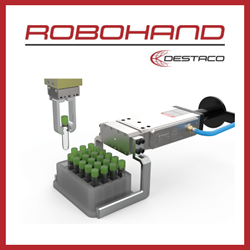Team of Robots To Help Manufacture Overflow Health Care and Quarantine Structures
ARM grant supports development of autonomous robot team
TROY, N.Y. — The stress that COVID-19 has placed on medical facilities across the country highlights the need for safe, convenient, and functional surge capacity that can be used for hospital care or quarantine during a public health crisis.
In this particular project, the Rensselaer team will support Pvilion, a company based in Brooklyn, New York, in producing self-erecting, solar-powered structures that can be configured to suit the needs of a specific mission, including providing critical care, shelter, quarantine, infection control, or other functions. Pvilion is also currently working with the United States Air Force Rapid Sustainment Office.
Manufacturing these structures requires manipulating and joining together multiple pieces of large, heavy, waterproof fabric. The Rensselaer team will design, build, and program a team of small robots that will be capable of holding the material, rotating it, and pulling it taut while it is being heat sealed together. The robots will work in coordination, guided by humans, as well as software and algorithms that will also be developed and built by Rensselaer researchers.
"We'll know the location of each robot, we'll know which direction they are pointed, and we will know which direction they are exerting forces," said Glenn Saunders, a senior research engineer within the Center for Automation Technologies and Systems at Rensselaer, who is leading this project with John Wen, head of the Department of Electrical, Computer, and Systems Engineering. "The swarm behavior happens when the robots begin pulling and rotating the fabric at the sewing machine or heat sealer."
The Rensselaer team and Pvilion will also work with Albany Medical College (AMC), which not only has expertise in health care, but also in caring for COVID-19 patients specifically. The AMC team will share its medical perspective to improve the design of the structure.
This research is being expedited within a one-year timeline to address current challenges brought about by the pandemic.
"This project answers a timely challenge in both manufacturing and health care," Saunders said. "These robots are needed to fill a real void in manufacturing that's currently present. They will enable faster production of a structure that could give medical teams the extra space they need to respond to a pandemic like the one we're currently experiencing."
About Rensselaer Polytechnic Institute
Founded in 1824, Rensselaer Polytechnic Institute is America's first technological research university. Rensselaer encompasses five schools, 32 research centers, more than 145 academic programs, and a dynamic community made up of more than 7,600 students and over 100,000 living alumni. Rensselaer faculty and alumni include more than 145 National Academy members, six members of the National Inventors Hall of Fame, six National Medal of Technology winners, five National Medal of Science winners, and a Nobel Prize winner in Physics. With nearly 200 years of experience advancing scientific and technological knowledge, Rensselaer remains focused on addressing global challenges with a spirit of ingenuity and collaboration. To learn more, please visit www.rpi.edu.
Featured Product

DESTACO - Revolutionizing Industrial Automation
Looking for a reliable solution to enhance your automation process? Look no further than the DESTACO Robohand Grippers. These grippers are designed for the modern world of robotics, offering unparalleled performance and precision. Whether you need to grip fragile items, irregularly shaped objects, or heavy-duty components, the DESTACO Robohand Grippers have got you covered. Their modular design allows for quick and easy customization, ensuring a perfect fit for your application.
